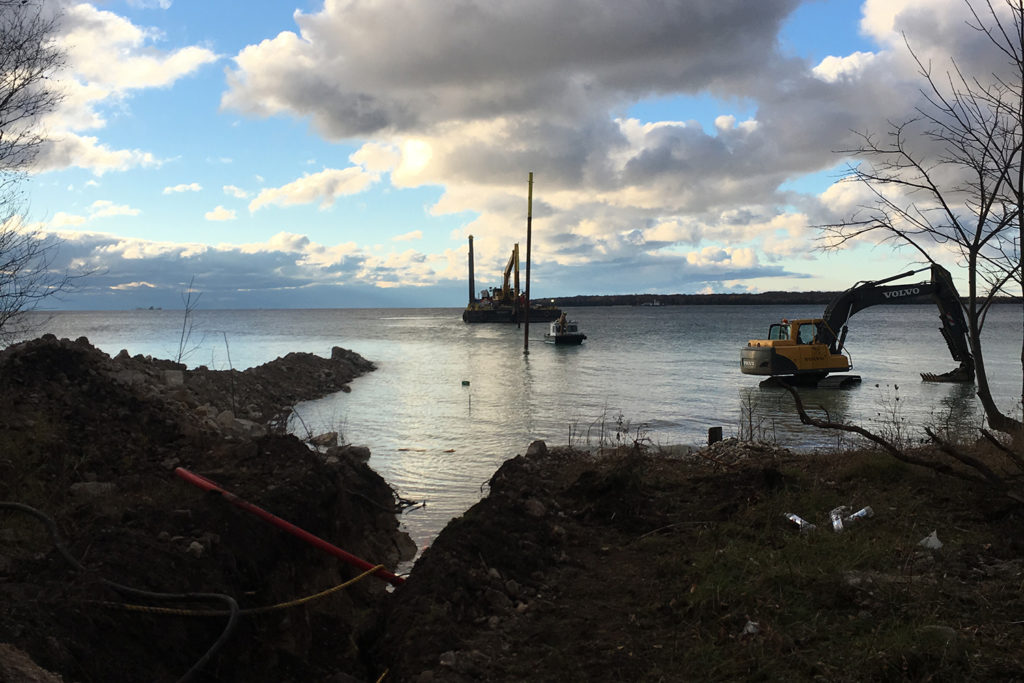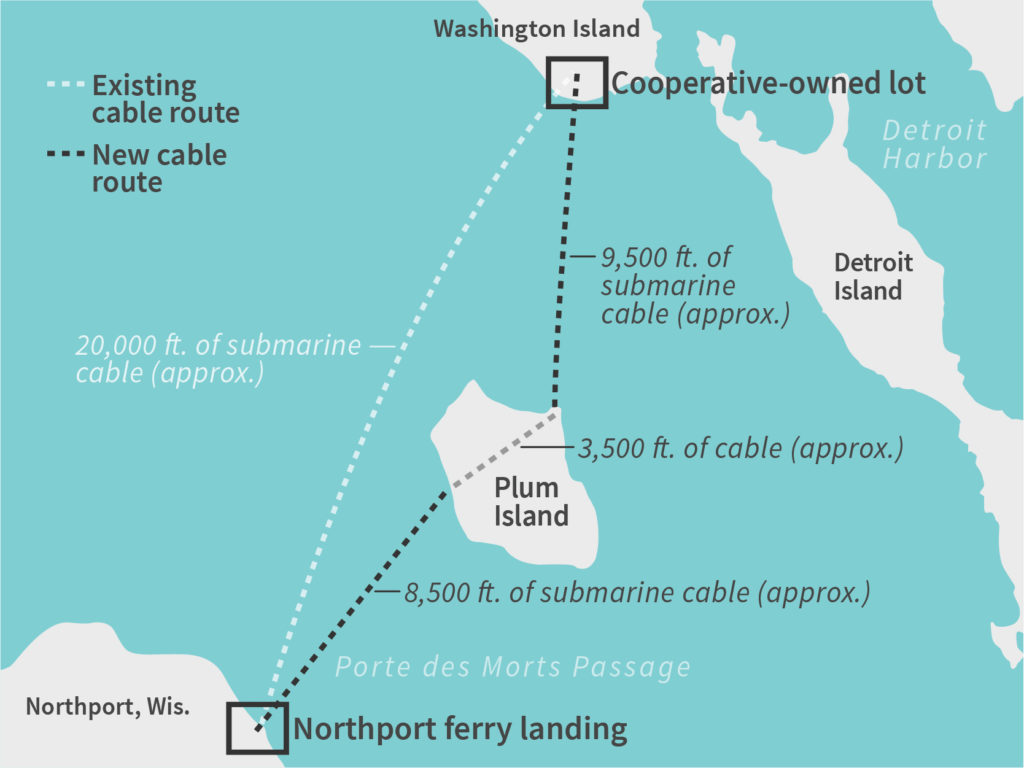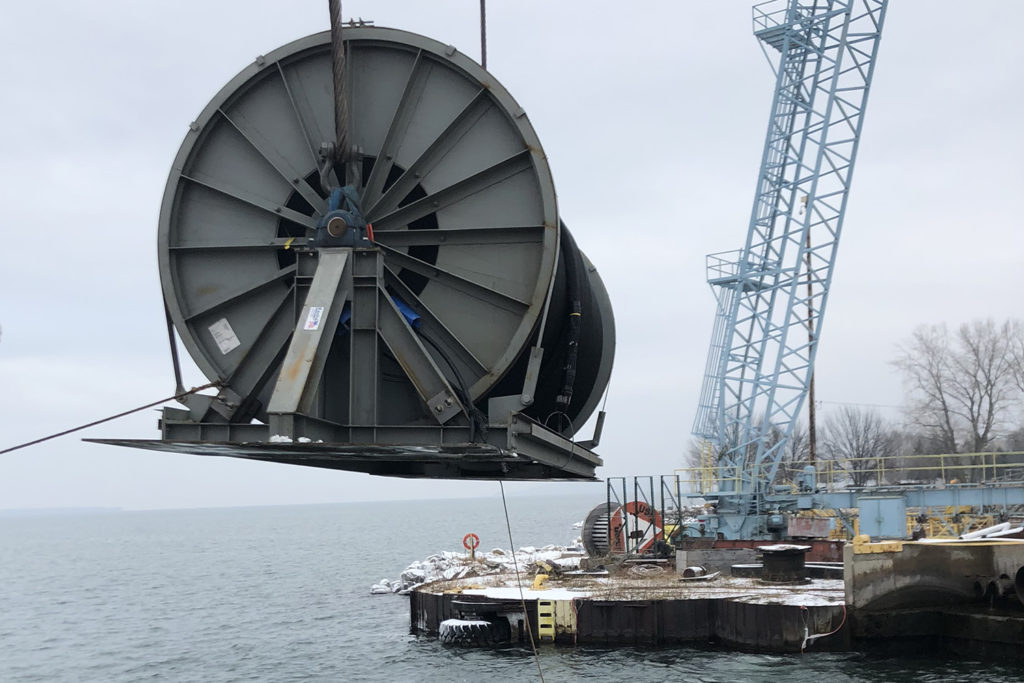
Spooked by tales of shipwrecks and the mysterious deaths of warring tribes of Winnebago Indians, French explorers came up with a name sometime around 1700 for the seven-mile waterway between Washington Island, Wisconsin, and the mainland. That name sticks today: Porte des Morts, or Door of the Dead.
Today, for Washington Island Electric Cooperative, the biggest foe lurking at “death’s door” is time.
The co-op has been laboring mightily since summer to replace a failed underwater electric cable from the mainland. While the end of the $3 million construction project is in sight, teams of engineers, divers and other specialists are also up against the rapid onset of ice, snow and rough waters.
An emergency repair was done shortly after the mid-June outage. But it’s unclear how long the spliced 20,000-foot cable—the island’s only source of power—will last. If bad weather prevails, further work may be postponed until late April or early May.
“We’re on track to finish the project, but we’re definitely racing against the clock. There are no two ways about it. Late fall/early winter isn’t the best time to be doing this type of work,” said Robert Cornell, general manager of the Washington Island-based co-op.
If ice and snow delay the project, it won’t be the first time the elements are to blame.

After the cable’s mid-June failure, investigators discovered that “ice shoves,” or shoreline ice pileups, damaged a 40-foot section of cable, causing an island-wide, 20-minute power outage. Diesel generators ran nonstop for 12 days until the initial repair, and since then the island’s been operating under a state of emergency issued by outgoing Gov. Scott Walker.
The backup generators “were the first of multiple temporary solutions,” said Cornell. “Splicing of the damaged cable was yet another temporary step. However, it’s likely ice damage may have occurred elsewhere along the line.”
When the repairs are completed, the island will have a more robust electric system that includes a fiber-optic cable. And instead of a single underwater line running under the Porte des Mortes waterway linking Washington Island to the mainland, power will flow through three smaller cables. To make future repairs easier, one of the cables will run above ground on another island.

The three-cable solution is a more expensive and time-consuming process, but business owners appreciate the co-op’s extra efforts to keep the lights on.
The co-op’s quick actions and months of perseverance for keeping the lights on “have been a gift,” said Hoyt Purinton, a co-op director and president of Washington Island Ferry. “People would have been heading for the root cellar if the cooperative hadn’t acted quickly to get a new replacement. Running for days or weeks or months off a generator or in some kind of reduced capacity, peak season or off-season … People live here and that fear can send a shock wave throughout the community.”
The co-op’s efforts to maximize work during the small window of time also included overcoming regulatory hurdles. Working with several state and federal agencies, the co-op won a permit that sped up the job considerably to install the aboveground cable on Plum Island, where there’s a National Wildlife Refuge and buildings on the National Historic Register.
“Under normal circumstances, it could have taken over two years for approval, but folks at the U.S. Fish and Wildlife Service understood our urgency. It took us two to three weeks instead of months,” said Cornell.
Crews have been waiting for deliveries of two reels of submarine cables to place in trenches on four required shore landings dug in October. A barge will deliver both reels from Sturgeon Bay to Washington Island, a 10-hour trip.
“Wind will definitely affect the barge’s ability to make the trip, in addition to the actual cable-laying exercise, but the trenches are dug, the conduit is in, and we just need to do a little bit of finish work for cover. Then we need four good days to install the cable,” said Cornell.
For now, when the lights blink on Washington Island, Purinton and the co-op’s 1,000 residential and commercial members hope for the best.
“My heart skips a beat each time the lights blink,” said Purinton.
Victoria A. Rocha is a staff writer at NRECA.